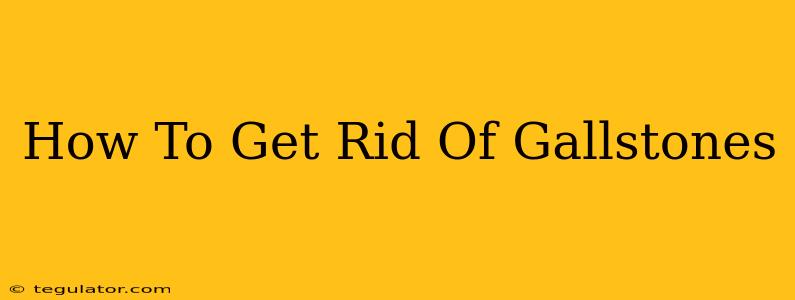Gallstones. Just the word conjures up images of intense pain and discomfort. These hardened deposits of cholesterol and bile can cause significant problems, ranging from mild discomfort to debilitating attacks requiring emergency medical attention. This comprehensive guide will explore various ways to address gallstones, focusing on both preventative measures and treatment options. Remember: This information is for educational purposes only and does not replace professional medical advice. Always consult your doctor before making any decisions regarding your health.
Understanding Gallstones: Types and Causes
Before delving into treatment, let's understand what gallstones are and what causes them. There are two main types:
- Cholesterol gallstones: These are the most common type, composed mainly of cholesterol.
- Pigment gallstones: These are less frequent and form due to an excess of bilirubin in the bile.
Several factors can increase your risk of developing gallstones:
- Being overweight or obese: Excess weight significantly raises your risk.
- Rapid weight loss: Drastic weight loss can disrupt bile production.
- High-cholesterol diet: A diet rich in saturated and trans fats increases cholesterol levels.
- Family history: Genetics play a role in gallstone formation.
- Certain medications: Some medications can increase the risk.
- Age and gender: Women are more prone to gallstones, and the risk increases with age.
Natural Ways to Manage Gallstones (Consult your Doctor First!)
While surgery is often necessary for gallstones, some lifestyle changes and natural remedies may help prevent their formation or manage mild symptoms. Always consult your doctor before trying any of these approaches. These are not cures and may not be suitable for everyone.
Dietary Changes:
- Increase fiber intake: Fiber helps regulate cholesterol levels. Include plenty of fruits, vegetables, and whole grains in your diet.
- Reduce saturated and trans fats: Opt for lean protein sources, healthy fats (like olive oil and avocados), and limit processed foods.
- Increase water intake: Staying hydrated helps flush out the biliary system.
- Consider a low-cholesterol diet: This can help prevent the formation of cholesterol gallstones.
Herbal Remedies (Consult your doctor before use):
- Milk thistle: Some studies suggest it may support liver health.
- Turmeric: This spice has anti-inflammatory properties.
- Dandelion root: Some believe it can improve bile flow, but more research is needed.
Important Note: The effectiveness of herbal remedies for gallstones is not fully established, and they should not replace medical treatment.
Medical Treatments for Gallstones
When lifestyle changes and natural remedies are insufficient, medical intervention is often necessary. Common treatments include:
- Medication: Certain medications can help dissolve cholesterol gallstones, but this is usually only effective for small stones.
- Extracorporeal shock wave lithotripsy (ESWL): This non-invasive procedure uses shock waves to break up gallstones.
- Endoscopic retrograde cholangiopancreatography (ERCP): This procedure involves inserting a scope to remove stones.
- Cholecystectomy (Gallbladder Removal): This is the most common surgical procedure for gallstones, involving the removal of the gallbladder. This is often the preferred treatment option for symptomatic gallstones.
Preventing Gallstones: A Proactive Approach
Preventing gallstones is far easier than dealing with them once they've formed. Here are some key preventative measures:
- Maintain a healthy weight: Losing weight gradually, if you are overweight, is beneficial.
- Eat a balanced diet: Focus on a diet rich in fruits, vegetables, whole grains, and lean protein.
- Regular exercise: Physical activity promotes overall health and can help manage weight.
- Limit alcohol consumption: Excessive alcohol intake can increase your risk.
When to See a Doctor
Seek immediate medical attention if you experience:
- Severe abdominal pain: This is a common symptom of a gallstone attack.
- Jaundice (yellowing of the skin and eyes): This indicates a possible blockage of the bile duct.
- Fever and chills: These can signify an infection.
- Nausea and vomiting: These symptoms often accompany gallstone attacks.
Gallstones are a serious medical condition. By understanding the causes, risk factors, and treatment options, you can take proactive steps to protect your health and address any issues promptly. Remember to consult with your physician for personalized advice and treatment. Early diagnosis and appropriate medical management are crucial for preventing complications and ensuring optimal health.

